Caroline Leavitt's Blog, page 98
January 27, 2013
FEB 21 Christina Sneed talks about Little Known Facts, celebrity, maintaining a good mood, and so much more
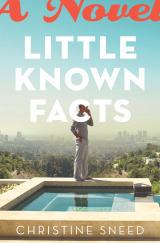
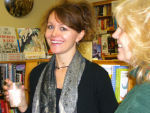
Christine Sneed is a graduate of the MFA creative writing program at Indiana University and has published stories in Best American Short Stories, PEN/O. Henry Prize Stories, New England Review, The Southern Review, Ploughshares, Pleiades, Glimmer Train, Massachusetts Review, Meridian,Other Voices, Greensboro Review, River Styx, Phoebe, South Dakota Review, and many other journals.
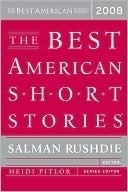 She has been awarded an Illinois Arts Council Fellowship in poetry and has been nominated for several Pushcart Prizes and received special mentions in the Pushcart anthology for stories "Quality fo Life" and "Beach Vacation." Along with a 2010 Los Angeles Times book prize, first-fiction category, for her story collection, Portraits of a Few of the People I've Made Cry, Portraits was awarded Ploughshares prize for a first book, the John C. Zacharis Prize, and was chosen as the Book of the Year by the Chicago Writers Association for traditionally published fiction. It was also longlisted for the Frank O'Connor International Short Story prize. She lives in Evanston, IL and teaches creative writing for Northwestern University's graduate writing program and for Pacific University's low-residency MFA program.
She has been awarded an Illinois Arts Council Fellowship in poetry and has been nominated for several Pushcart Prizes and received special mentions in the Pushcart anthology for stories "Quality fo Life" and "Beach Vacation." Along with a 2010 Los Angeles Times book prize, first-fiction category, for her story collection, Portraits of a Few of the People I've Made Cry, Portraits was awarded Ploughshares prize for a first book, the John C. Zacharis Prize, and was chosen as the Book of the Year by the Chicago Writers Association for traditionally published fiction. It was also longlisted for the Frank O'Connor International Short Story prize. She lives in Evanston, IL and teaches creative writing for Northwestern University's graduate writing program and for Pacific University's low-residency MFA program. So much about this wonderful book is about our obsession with celeb culture. Why do you think we are and why do you think the cost or our obsession is so high?
Celebrities generally embody the sexual, economic, and social ideals that most of us learn from early childhood to aspire to. They seem to live charmed lives: gorgeous, wealthy, talented people who can fly off to Nice or Tokyo or Paris at a moment's notice, first class of course, or on their own planes. They don't have to sit in cubicles for any part of the day (unless they're making a film set in office...), they routinely get $300 haircuts, manage to maintain great biceps and sleek legs with the help of their personal trainers...I think it's clear why the mere mortals who populate most of the planet look at them with admiration and envy. One thing I've been thinking about for a while is that everywhere you turn, there's proof that this charmed celebrity lifestyle is a mirage - there are celebrities getting arrested for DUIs, drug-dealing, beating up their family members (or worse). I'm very interested in the dissonance between the fantasy and what seem to me the realities of celebrity, and Little Known Facts is the way I tried topuzzle out these preoccupations and contradictions.
What's your writing life like? How do you write--outline, by the seat of your pen--?
In general, I don't outline short stories, but with novels, I've found that it helps keep me focused if I do sketch out some guidelines for subsequent chapters. I generally don't have a set writing schedule either - I try to write every day or two, maybe four or five days a week, more if I have the time, usually for an hour or two, sometimes more. IT depends in part on how much I'm teaching - the more teaching, the less writing, no surprise.
There's so much in the book about how "we should be happy." Can you talk about that, please?
One thing I'm discovering as I get older is how hard it is to maintain a good mood, to maintain optimism and a sense of joyful (or semi-joyful) discovery. From my experience, from talking to friends and family, I think that as we get older, a lot of us feel that life gets sadder and harder. Andthat's just the way it is; you realize how complicated relationships are, how much your ego needs to be fed, how easy it is to offend and be offended, how are bodies are slowing down, how disappointing our political situation is, how disappointing people in power are...the ego is really a devastating, unforgiving, ravenous machine. It does feel like a machine to me sometimes - no conscience at all. I guess I'm getting Freudian here. I think as I get older I'm also realizing how important it is to be kind and forgiving but finding forgiveness and kindness isn't as easy to do as it might have been when we were younger. My characters in Little Known Facts are feeling guilty and at a loss because despite their enormous privileges, they aren't very happy most of the time. I don't blame them - whatever great things you have, whatever gifts you have, however much money, there's still a fundamental unrest and a desire for something else (often mysterious) at the heart of our lives - this is the human condition, as I see it.
How do you know what you know about celebrity and Hollywood? Did anything surprise you?
I have friends and a couple of family members who work in Hollywood who I pestered for answers to some of my technical questions but most ofwhat's here is fabrication. Being a lifelong movie addict, I think I picked up a lot of things from watching films and documentaries too, as well as having fun imagining some of the irritations and pleasures of being a famous player in Hollywood. I think i was most surprised about the kind of dough some actors are pulling down (even though this probably isn't a surprise to most people) - $12 million or more per picture for the biggest guysout there. Damn, that's crazy, isn't it?
What's obsessing you now and why?
I worry about the next book - I've been writing new work to keep my mind off of how Little Known Facts will be received. I can't seem to relax and let myself enjoy its release the way I'd like to. I'm thinking that other writers have had similar reactions to their own new books' releases - you worry about continuing to make ends meet. I want to keep buying the coffees and chocolate croissants I've become addicted to lately.
What question didn't I ask that I should have?
Is this book about anyone in Hollywood specifically? Harrison Ford was mentioned in some of the ad copy. Is it about him?
It's not about Mr. Ford and his family at all, but it is about the kind of fame he has achieved and how it might affect those he's closest to - I was thinking of several actors when I was writing this book - Paul Newman, George Clooney, Robert Redford, Brad Pitt.
Published on January 27, 2013 17:31
Meredith Maran talks about Why We Write, odious genre labels, and so much more
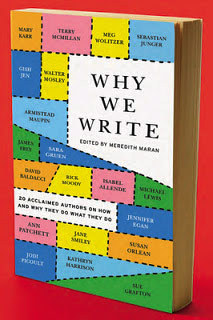
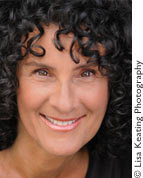
You know the friend you can sit across a table from in a cafe for lunch, and the next thing you know it's dinner time and you've been laughing so hard that you haven't even touched your chocolate croissant? That's what being with Meredith Maran is like. I love Meredith. You've never met anyone as warm, interesting, and downright funny, plus she's one of the most big-hearted and generous people on the planet. The author of eleven nonfiction books and a novel, A Theory of Small Earthquakes, and she's a member of the National Book Critics Circle, Meredith writes features, essays, and book reviews for People, Salon, The San Francisco Chronicle, The Boston Globe, The Chicago Tribune, Self, Real Simple, Ladies Home Journal, Mother Jones, Family Circle, and More.
Why We Write isn't just fascinating, it's also really important. And I'm thrilled, honored and jazzed to have Meredith here. And yep, Meredith, I DID include your answer to the last question!
How did this book come to be?
I conceived it in 2010 when the "Chick Lit" battle was raging. On the Twittersphere, on book blogs, at literary events, and in the pages of the few remaining newspaper book review sections, the book world was hotly debating the meaning of "commercial" versus "literary" fiction. Bestselling authors Jennifer Weiner and Jodi Picoult argued that their work was disparaged as "chick lit," while equally accessible, popular novels by men like Jonathan Franzen were considered "literature." Commenting on The New York Times’ reviewing policies, Weiner told the Huffington Post: “How can anyone claim the paper plays fair when genre fiction that men read gets reviewed but genre fiction that women read doesn’t exist on the paper’s review pages?"
At the time I was about to publish my first novel, and I didn't even know what to hope for: would it be labeled "chick lit" and not be reviewed, but reach large numbers of readers? Or would it be labeled "literary fiction" and get reviewed but not read?
I thought the whole conundrum was ridiculous, and not at all helpful to the biggest struggle facing writers and readers, which is--not to put too fine a point on it--keeping books and writers alive. I had a feeling that the motivations of writers across genres had more in common than the style of work they produced, and that putting them between the covers of a single book might start a conversation among them, and among their readers. So I decided to ask a bunch of them the same ten questions about their relationship to their writing. Sure enough! David Baldacci and Rick Moody write for essentially the same reasons.
Oh--also, I needed the money to fund the writing of my second novel.
How'd you choose the writers you chose?
I had a few criteria: I wanted the writers I chose to be "famous," at least to their own audiences (I'd never heard of some of the best-selling authors in the book until I started putting it together). I wanted them to be identified as either literary or commercial. And I wanted them to be representative (unlike the NYTBR) of the writers working today: male, female, white, of color, young, old, novelists, journalists. Then I started with some of my favorite writers, most but not all of whom are considered "literary," and then tried to match each one with a writer who was, or was considered to be, his or her opposite--"commercial."
What surprised you about their pieces?
Almost everything! Overall, I was surprised by the similarities in their relationships to their writing. Nearly all of them defined their need to write as one of maintaining sanity. I was surprised, too, by their differences--mostly in the funny, odd, quirky things they do to prepare themselves to write, to write, and to recover from writing. Also, I was surprised by their openness and honesty. In a really poignant, candid moment, Jennifer Egan described the night she decided her first novel was terrible, and she'd never be a writer, and she went mad wandering the streets of the Lower East Side calling friends and telling them never to call her a writer again.
Did you see any themes emerging, similarities and definite differences?
Although by definition, all the writers in the book are commercially successful, I was surprised by how many of them have struggled to be published; how late in life several of them came to writing, and how hard they've fought to keep from being categorized. Walter Mosley comes to mind. He fought being boxed in as a genre writer, just as Jodi Picoult resents being called a writer of "chick lit."
Why do you write?
Same reason as the writers in the book: I'd go nuts if I didn't. And I do go nuts when I don't. I was a full-time writer for 25 years, during which time I woke up happy to go to work every single day--and went to sleep worried about money pretty much every night. Thanks to the changes in the publishing industry--lower advances, lower sales, years instead of months between selling a book to a publisher--I took my first full-time job at age 60. Luckily, I love the gig, but it's been a huge adjustment, finding time to write--not to mention getting dressed in the morning.
If you could choose three pearls from the collection that would be especially helplful to writers, what would they be?
Meg Wolitzer compares writing to a bouillon cube. She says the key to great writing is to pick ordinary moments and magnify them, so the reader can add water. I adore her work, so I wasn't surprised to adore what she has to say in this book.
Terry McMillan says she only writes about characters who disturb her, so she has something to discover about them, and so the characters have to win her over. I loved that! She also taught me a trick I immediately put to use in my own novel. When she's starting her character profiles, she goes to McDonald's, picks up a bunch of employment applications, and fills one out for each character she's creating. Genius!
What's obsessing you now?
Relief that Mitt Romney isn't President. My new in-sink dish drainer, which allows me to throw dinner parties in my new bungalow in Los Angeles. Wondering when and how I'll find time to finish my next novel. Eagerly awaiting some pretty cool events to promote Why We Write, with some pretty cool writers.
What question should I be mortified that I forgot to ask you?
Oh, my dear Caroline, you are so mortified so much of the time, always unnecessarily, that I refuse to contribute to it. You're a beautiful writer and a beautiful writing ally and a beautiful human being, and if you don't include this answer I'll know it and I'll out you on Twitter AND Facebook! Love you!
Published on January 27, 2013 12:17
January 26, 2013
Pulitzer Prize winning journalist Glenn Frankel talks about the story behind The Searchers, one of the most profound Westerns ever made
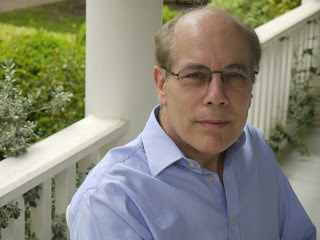
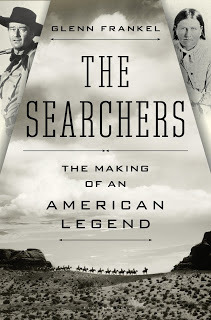
The Searchers is not just one of my favorite films--it's also one of Martin Scorsese's. Glenn Frankel's book, The Searchers: The Making of an American Legend, gets at the very heart of why and how this film is so important. He's the director of the School of Journalist and G. B. Dealey Regents Professor at the University of Texas at Austin, and he has been a visiting professor at Stanford, as well as a reporter and foreign correspondent for the Washington Post. He won the Pulitzer Prize for international reporting, and he's the author of Rivonia's Children: Three Families and the Cost of Conscience in White South Africa and Beyond the Promised Land: Jews and Arabs on a Hard Road to a New Israel. I'm honored to have him here.
The Searchers is actually one of my favorite films because it’s so disturbing. But as you so brilliantly point out, the film upends the novel it was based on, which centers on the true story of a white girl, Cynthia Ann Parker, captured by Comanches, who’s rescued as an adult, only to live in misery. Do you think the film would have been as equally disturbing if Ford had focused his story on Parker?
Actually, it was the novel that up-ended the original story by shifting the focus from Cynthia Ann to the uncle (and fictional adopted brother) who searched for her, and Ford followed the narrative path LeMay had established. LeMay and Ford were interested not so much in the abduction and in the life of the victim, but on the effect these traumatic events had on the pioneer community and the family. I do believe someone could make a terrific film about Cynthia Ann's life and the terrible price she paid. It would illustrate the human cost of the long twilight war of populations between Texans and Comanches. But it would have a very different focal point than The Searchers.
So much of your book, to me, is about the stories we tell others--and ourselves. While there were reports from white women about the brutality of Comanches, there were also reports of the Comanches; tenderness towards their children. So much of The Searchers, “a myth based on other myths” is infused with John Ford and John Wayne, that I wonder, do you think, unless someone writes, directs, produces and acts--that a story can ever be a pure one, especially since even readers bring their own experiences and feelings and prejudices to a story?
You're absolutely right in seeing the theme of storytellers and the way they use stories to explain the world to themselves and themselves to the world. Every story is a subjective one, and is influenced and shaped by the sensibility and the needs of the storyteller, and every story is received differently by the reader, audience, etc. So no story is "pure." Still, stories are universal: they have power and meaning and can be appreciated, albeit in different ways, by succeeding generations. We see things in The Searchers that an earlier generation may have missed or interpreted differently. I was surprised to read that the film was perceived in its time as just another pretty good John Wayne cowboy movie. It's only over time that people have come to understand its terrible power and what it says about race and love and gender.
Can you talk about how The Searches both upholds and undermines the myth of the savages vs. the noble white pioneer?
This is one of John Ford's great gifts. In The Searchers he presents the mythic John Wayne, our cinematic hero---the Indian fighter, the lone avenger, the charismatic seeker of vengeance and justice. We identify with Wayne because of his charisma. At the same time, we begin to see his flaws: he shoots the eyes put of an Indian corpse, scalps another corpse, breaks up a funeral service, and we begin to understand that his search for his niece has turned into a mission of retribution. Our dark knight intends to kill the damsel because she has been defiled by savages. At the same time, the purported savages themselves become humanized. We see the aftermath of a massacre of a Comanche village by troopers and we begin to understand the motives of Scar, the war chief, and to understand that he and Ethan, the Wayne character, share the same hatreds. The Searchers acknowledges and even embraces our conventional myths, then works hard to make us think twice about them.
Do you think that the fact that The Searchers is morally ambiguous is what will keep it a classic?
It's not moral ambiguity so much as artistic ambiguity that makes The Searchers a work of cinematic art. In so many places, Ford deletes the dialogue and exposition and simply gives us the visual narrative, leaving us to decide what it means. When the camera zooms in on Ethan's face at the fort where he has seen the deeply disturbed white Indian captives: is the expression on his face one of madness, despair or anger? Is it then he decides he will kill Debbie when he finds her? Ford doesn't tell us, and we must decide for ourselves.
Similarly, when Ethan runs Debbie down and must choose whether to kill her or rescue her, why does he make the decision he does? The shooting script has him utter a line that makes clear why he makes his decision, but Ford deleted it. He wants us to decide for ourselves. It's a wonderful artistic choice Ford makes.
What's obsessing you now?
1) Helping our students at the School of Journalism prepare for a very exciting but uncertain future.2) Figuring out how to talk about the vast amount of material and characters in my book in a 30-minute talk. Do I emphasize 19th century Texas or 20th century Hollywood? Cynthia Ann Parker or John Ford?
There are so many other questions we could discuss, Caroline. But these were great ones. I'll leave it here for now. Thanks for being such a thoughtful reader---it's all any author can ask for.
Best, Glenn
Published on January 26, 2013 09:15
January 24, 2013
And now for your reading pleasure, a bit from Suzanne Finnamore Luckenbach's Add to Cart: A Memoir of Loss, Lust and Securing My Second Husband Online
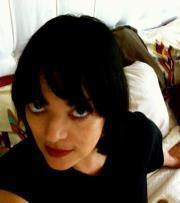
Suzanne Finnamore Luckenbach's written some of the bravest, smartest, funniest books around, chronicling her marriage (Otherwise Engaged), her baby (The Zygote Chronicles) , her divorce (Split) and now, Hot off the press, from "Add To Cart: A Memoir of Loss, Lust and Securing My Second Husband Online." I also have to say you can't hope for a better friend. Suzanne's the kind of person who somehow knows you were thinking about the stars, so she goes out and gets you all of your favorite constellations and then throws in a few planets, too.
Read. And love this sneak peek.
Chapter X A Lifetime Supply of Men: The Ten Commandments (Featuring Special Guest Star Augusten Burroughs)
I signed up for a year contract on Match.com. By now it was becoming obvious from the screaming on the redwood deck and the progressively apocalyptic engineering reports that my house was not going to whisk off the market anytime soon. Additionally, the monthly rate for Match was much lower with a longer contract. With a yearlong campaign, and if I applied myself, I could as Lulu promised acquire a lifetime supply of men.
They are as follows:
The Ten Commandments To Online Dating
1. Thou shalt lie.
Pretend to love men unreservedly. Pretend to be a few years younger and much happier. It will show on your face. Everything shows on your face.
2. Do Not Be All Things To All People
Your goal is not to cast a dragnet and get as many men as you can shovel into your pit. Your goal is to be yourself, only better, and have that stance draw a stable of good matches.
3. One Log Won’t Burn
Date as many men as you can handle. If you meet someone you really like, throw another log/man onto the fire and watch it blaze up. If you meet a man you really like, do not focus on them, they will sense this and run for the hills. The more men you date the more attractive you are to the men you date, because they are animals. Animals and rogues. It would be nice if they weren’t but they are. Act accordingly.
4. The Man Pays
He always pays, especially in the beginning. If he doesn’t pay in the beginning he will never pay, and he probably doesn’t care either. When the check arrives, do nothing. If he doesn’t pay, fuck him. He is either poor or he thinks he is a woman. Please.
5. No Soliciting
You’ve gone online and you’ve put up an ad for yourself, essentially. This is enough. Do not sell yourself past this. Do not ask him how he feels or tell him how wonderful he could be if he buys into you. That’s the job of a bible salesman. You are not a bible. You’re the opposite of a bible.
6. Be Particular
Jerry Hall once said that choosing a husband is much like choosing a diamond: “You don’t want the one with the obvious flaw.”
My friend Augusten Burroughs further expounded on this in a timely email to me when I announced I wasgoing online, which he fullu supported and said, in essense, Finally.
“Bwabee? Here are the ONLY requirements:
1. Must have own source of income.
2. Must not be a criminal
3. Must not be married
4. NEED not be handsome but you MUST find him attractive, more so on each date.
5. Reads
6. Is patient, non judgemental and has no history of mental illness -especially manic depression, chronic depression, treatment-resistant depression or any other fucking flavor of incurable depression.
and that's really it.
AB”
7. Do Not Call Back
I’m not saying you shouldn’t call him back if you like him and he calls. I am saying you shouldn’t run to the phone singing that wonderfully deranged song from the seventies that we all saw ourselves in:
“...Let it please be him, Let it be him. It must be him, it must be him.... Or I shall die”
Let him marinate. Men are animals, and animals need to marinate, to tenderize. Wait two days, even if it fucking kills you. It won’t. In fact it bring you thrillingly to life ---you will begin to feel as if you are in full control. It’s an illusion, but it’s a good one as illusions go, and terribly useful.
8. Demand Flowers Without Seeming To
Once again I envision with icy clarity a battalion of women, this time in motorcycle boots and long batik patterned skirts, telling me I am wrong to want flowers and that this is an outdated notion that degrades women. This same task force already had a cerebral contusion when I suggested that a woman shave a few years off her age.
(But where are those women now? I will tell you: they are making cheese in California and attending consciousness raising groups. Tra la.)
To demand flowers, simply ask the man what his favorite flower or plant is. Then tell him what your favorite flower is. Then change the subject and visualize those flowers hurtling toward you. The flowers will come; bonus points if they are delivered to your door. Oddly enough, the direct approach can also work. I have been known to say; “I would love to get some flowers, baby. That would be terribly exciting.” Men want to please someone they know is capable of being excited, someone who never demands but suggests exactly what she wants and then doesn’t harp on it. They have been married before, most of them. They fear the Continuous Loop of a woman saying “I shouldn’t have to ask you. You should just know.” Which is a patent falsehood: You do have to ask, and they don’t know.
9. Go Ahead, Have The Sex
Why deny yourself the pleasure of sleeping with a man until the third date due to a fear of being cast aside? Fourth date sex is no guarantee of longevity. (There are commandments in love, but few rules. Disavow yourself of the notion that there is a formula to true love, like baking a pie. The formula doesn’t exist.)
I had sex on the first date sometimes. I may have regretted some of the men, but I never regretted the sex. John Updoke said, “If I had my life to do over again, the last thing I would give back is the fucking.” It’s an old wives take that a man disrespect and dislike loose women. They actually don’t. Well, some do, but not the kind you should be interested in. You should be interested in the kind of man who not only has a hard time keeping his hands off of you, he can’t wait to see you again. You want a man who is addicted, not a man who is totting all your sexual favors in a ledger and cross-referencing it with a social sanctioned timetable.
10. He Doesn’t Exist
When you are not with him, your life goes on. He doesn’t exist unless he says or does something that brings him to center. Sadly, if you immediately make him the center he has an excellent view of all the other women clustered round him who have also made him the center. You want to be the one offstage that he wonders about. The one, whom he suspects, at first, doesn’t know he exists. So don’t know it. Don’t Facebook friend him, don’t Tweet him, don’t text him or put him on your speed dial or Favorites, because he doesn’t officially exist, until he does. Keep your mitts off the steering wheel. Men love to drive; they become upset when they are not driving. They don’t think we can see a parking space in full view, they never have. Allow him the continuous opportunity to recall his existence to your attention. Is it a game? No, it’s a life strategy that I plan to employ well into my hundreds, with my next husband. Even if you are crazy about him, do not show the crazy. Let him drive, let him park, let him wander through the dark. You’re the light.
Published on January 24, 2013 16:49
January 23, 2013
Love is Strange--especially when I write about it for Sunday NYT Modern Lovew
I usually give this blog up to other writers, but I'm so excited I'm going to grab some real estate myself.
I always say I am the poster girl for never giving up. I've tried to get into the New York Time's Modern Love column for at least six years now. I always got back a polite no. There were always good reasons why they didn't want my piece. My piece went too far back in time. Or it didn't quite fit what they were looking for. Or it simply rambled. I finally assumed that they just didn't want ME (like any neurotic would). Recently I was talking to a writer I know and telling a story, when she said, "You should write that to Modern Love." I didn't see it, but I figured I had nothing to lose, and so I did, sending it in, expecting nothing.
Two weeks later, I got an email and as soon as I saw it, I knew it was another rejection. I almost didn't open it. (We pause to tell you why: Many years ago, when I was first trying to get published, I ripped a brown self addressed stamped envelope in two, sure it was a rejection I couldn't bare to read. While the pieces fluttered around me, I saw the word: CONGRATULATIONS. I scrambled to pick up the pieces and discovered I had won First Prize in Redbook Magazine's Young Writers Contest!) But I did open the email, and saw that they are going to publish my piece, probably Feb. 10th, if all goes well.
I'm thrilled, thrilled, thrilled! I hope you will all read it!
I always say I am the poster girl for never giving up. I've tried to get into the New York Time's Modern Love column for at least six years now. I always got back a polite no. There were always good reasons why they didn't want my piece. My piece went too far back in time. Or it didn't quite fit what they were looking for. Or it simply rambled. I finally assumed that they just didn't want ME (like any neurotic would). Recently I was talking to a writer I know and telling a story, when she said, "You should write that to Modern Love." I didn't see it, but I figured I had nothing to lose, and so I did, sending it in, expecting nothing.
Two weeks later, I got an email and as soon as I saw it, I knew it was another rejection. I almost didn't open it. (We pause to tell you why: Many years ago, when I was first trying to get published, I ripped a brown self addressed stamped envelope in two, sure it was a rejection I couldn't bare to read. While the pieces fluttered around me, I saw the word: CONGRATULATIONS. I scrambled to pick up the pieces and discovered I had won First Prize in Redbook Magazine's Young Writers Contest!) But I did open the email, and saw that they are going to publish my piece, probably Feb. 10th, if all goes well.
I'm thrilled, thrilled, thrilled! I hope you will all read it!
Published on January 23, 2013 08:15
January 20, 2013
Winslow Eliot talks about "What Would You Do If There Was Nothing You had to Do?
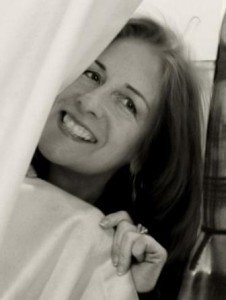
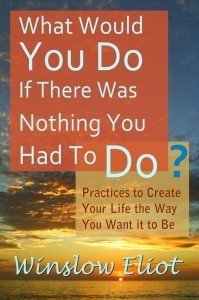
I admit I first became interested in Winslow Eliot because I really thought she had the coolest name on the planet. I quickly discovered that her name wasn't the only thing cool about her. She's not only the author of several novels, including Pursued, A Perfect Gem, Heaven Falls and Bright Face of Danger, and she's also written Writing Through the Year, which features some of her writing practices from her WriteSpa. Her latest, What would You Do If There Was Nothing You Had To Do is meant to help writers (and everyone, really) find their natural path in life. And wait, there's more! Her next novel, The Happiness Cure, will be published in 2013. Thanks for writing something for the blog, Winslow!
What Would You Do If There Was Nothing You Had To Do?
Late last winter the title for my first non-fiction book came spinning at me like a galaxy: “What Would You Do If There Was Nothing You Had To Do?” I used the archetypal Fool’s journey as a launching place and from the first step I took over the edge of that cliff, the book seemed to write itself. From the first few pages, the motion forward felt so powerful and ‘real’ that I spoke to people about my project as though it had already been written. Which, looking back, it already had: I found myself rather like the source of a mountain spring – the words, ideas, exercises gushed out of me without pause. I think from start to finish, and writing twelve or so hours a day, I was finished in three months. Then I spent another three months revising, and then having the book professionally edited and finally proofread. The whole process from first page to publication took nine months. I’m serious.Each time I would come to a place where I thought I’d need more research, or I felt inadequate to express something, it was as though a wand touched my shoulder and reminded me that I already knew everything I know, and it was time to share that. The flow never ceased.I know that much of the “flow” came from my beloved mother, who had died the summer before, but who never felt very far from me. Her encouragement, enthusiasm, and belief in me permeated this endeavor. So much of the wisdom of the book draws on her wisdom: A woman well ahead of her time, she had an organic compost on the terrace of her New York City penthouse back in the 1950s; she took my brother and me on a freighter trip around the world to teach us geography; and she cared about esoteric thinkers and writers long before it was fashionable. Many friends have told me how she opened a door for them by her practical spirituality, her delight in adventure, her commitment to being generous and helpful to others. Most of all, I remember her passionate injunction to “Have fun!”From my earliest memories I’ve sought an understanding of the great questions of “What is it all for? What is it all about?” Perhaps by now I’m finally getting a glimpse. “What Would You Do If There Was Nothing You Had to Do? Practices to create your life the way you want it to be” became a synthesis of what I understand so far about “how to live.” One thing I know: Each one of us has to answer this question for ourselves. This book became my humble attempt to help other people discover how to live with joy, serenity, generosity, and fun.
Published on January 20, 2013 11:46
Wiley Cash, author of the NYT bestseller, A Land More Kind Than Home, talks about returning to his childhood library
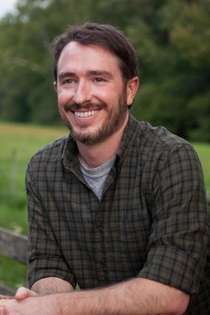
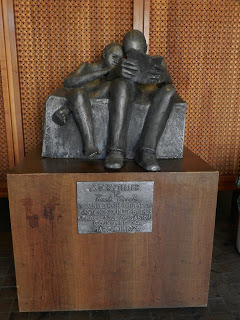
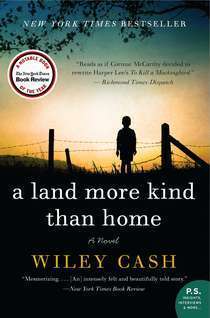
Wiley Cash isn't just a really great guy, he's also a superlative novelist, and I wasn't the only one raving about his debut, A Land More Kind Than Home. It was a New York Times bestseller, and a New York Times Notable book of 2012. Kirkus, Library journal and Books-a-Million also put it on their Best Books of 2012 list, and it was the Debut of 2012 from UK's Crime Writers' Association, as well as a Barnes and Nobel Discover Great Writers Selection, and IndieNext Pick an a Southern Independent Booksellers's Alliance Pick. I'm thrilled to have Wiley here again. Thank you, Wiley.
Wiley Cash on Returning to His Childhood Library: What He Found, What He Remembered, What He’ll Never Forget
Sixth birthdays were special in our family because that was the day you got your first library card, and once you got a library card you’d never be bored for the rest of your life. Boredom was something hard to come by in our neighborhood in Gastonia, North Carolina, where we had a basketball hoop in the driveway and miles and miles of woods and fields and streams all around us. But you could only spend so much time shooting baskets or playing in the woods or searching the creeks for turtles. You’d eventually have to come inside when it rained or when it was time for bed, and what were you going to do then?
I grew up with a mother who read to my sister, brother, and me, and early on I understood that life isn’t just about the things you do; it’s also about the things you think, and thinking is what reading gave me the time and the tools to do. That may be why I was always so taken with the sculpture “Storyteller” that sat in the foyer of the main branch of the Gaston County Public Library. The sculpture is of a person holding a book in his lap, reading it aloud to a much younger person who sits on his right. There was always something comfortable, familiar, and magical about that sculpture, and I still felt that way when I saw it in May 2012 when I was at the library to read from my novel A Land More Kind Than Home, out in paperback from William Morrow/HarperCollins on January 22, 2013.
By the time I visited the library in my hometown, I’d already been on book tour for two weeks, visiting dozens of book stores and book clubs all over the south. But this was different; this was the place that had turned me into a writer, and I knew I’d see, at least I’d hoped to see, the people who gave me stories to tell. I wasn’t disappointed. Several of my teachers from elementary and junior high school were there, and so were old neighbors and friends and parents of friends who I hadn’t seen in years. Neither I or my family have lived in Gastonia since 1998, but on that day in May it was like I’d never left home, and I didn’t feel that way just because of who was in the audience. I also felt at home because of the library itself.
The next morning, before I left town for another event in Charleston, South Carolina, I went back to the library to see if the magic of the previous day had faded after the reading was over, the books had been signed, and the people I’d known all my life had gone home. But the magic returned when I stepped into the foyer and saw the old sculpture I’d been seeing all my life. I spent the next couple of hours wandering through the library, picking up books I’d checked out when I was a kid and looking for my own book on the shelves. To my delight, it wasn’t there. “They’re all checked out,” a But the most memorable part of the day came when I took a trip upstairs to the periodicals section to look for a story that had been haunting me for years. When I was fifteen years old, two young sisters who’d gone to my church were both murdered by their considerably older boyfriends. I’d thought about those two girls a lot over the course of my life, and I think something about their story went into my second novel, which is about two young sisters whose father kidnaps them from a foster home in Gastonia. The two girls who’d been murdered were foster children as well, and they’d spent part of their lives being raised by an elderly couple from my church. I knew the couple’s names and the girls’ first names, but I never knew their last names, and I was never able to find them even though I’d spent years searching the internet for any news of two young sisters who’d been murdered in Gastonia, North Carolina, in the early 1990s. But it only took the reference librarian about fifteen minutes before I was looking at a microfiche of the two sisters’ faces on the cover of The Gaston Gazetteon the day after their bodies were found covered in lime in a shallow grave at the foot of Crowder’s Mountain. The girls looked exactly as I’d remembered them, but there was so much I’d forgotten about their story that I was now able to learn. I thanked the reference librarian over and over, and I told her I’d spent years trying to find the information that she’d found in a matter of minutes. “That’s what we’re here for,” she said, smiling. “We love it when the internet isn’t enough.”
I left the library that day knowing I’d return, whether it would be to roam the shelves the same way I’d once roamed the woods behind my house as a child or to discover the mysteries of my youth by opening the pages of history in order to write my own. I have to go back. All the things I remember, all the things I’ve forgotten, and all the things I want to know are there.
Published on January 20, 2013 11:34
January 16, 2013
Weekend Edition's Scott Simon talks about writing to make sense of the world, his favorite Weekend Edition Show, adoption and so much more
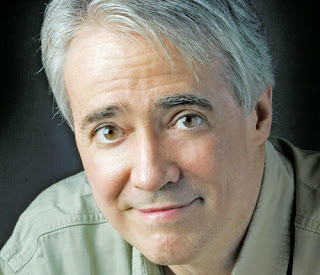
I am so completely thrilled and honored to interview Scott Simon, the host of Weekend Edition Saturday. I first met Scott virtually on Twitter, when he responded to a post of mine, and we began to chat. I soon found out that as well as being brilliant, he's also off-the-wall hilarious. (I shared my favorite game with him, deciding which you would rather be: a chimpanzee with the brain of a man, or a man with the brain of a chimp.)
His resume is dazzling. Scott Simon has reported from all 50 states, covered presidential campaigns and eight wars, and reported everywhere from Africa to the Middle East. His work was part of the Overseas Press Club and Alfred I. duPont-Columbia University Awards NPR earned for coverage of Sept. 11 and its aftermath. He was part of the NPR news team that won prestigious Alfred I. duPont-Columbia University Awards for covering the war in Kosovo as well as the Gulf War. In 1989, he won a George Foster Peabody Award for his weekly radio essays. He received a Major Armstrong Award in 1979 for his coverage of the American Nazi Party rally in Chicago, and a Unity Award in Media in 1978 for his political reporting on All Things Considered. He also won a 1982 Emmy for the public television documentary The Patterson Project, which examined the effects of President Reagan's budget cuts on the lives of 12 New Jersey residents. A frequent guest host of the CBS television program Nightwatch and CNBC's TalkBack live, he's also appeared on NBC's Weekend Today and NOW with Bill Moyers. He also narrated the documentary film "Lincoln of Illinois" for PBS. Simon participated in the Grammy Award-nominated 50th anniversary remake of The War of the Worlds, and hosted the BBC series Eyewitness. He's written for the New York Times Book Review and Opinion sections, the Wall Street Journal opinion page, the Los Angeles Times, and Gourmet Magazine.
But wait, there's more!
Simon's Home and Away: Memoir of a Fan topped the Los Angeles Times nonfiction bestseller list for several weeks, and was cited as one of the best books of the year in the Washington Post, Boston Globe, and several other publications. His second book, Jackie Robinson and the Integration of Baseball, kicked off the prestigious Wiley Turning Points series, and was the Barnes & Noble "Sports Book of the Year." Simon's first novel, Pretty Birds, about female teenaged snipers in Sarajevo, was released in 2005. His political comedy, Windy City, was chosen by the Washington Post as one of the best novels of 2008. Baby, We Were Meant for Each Other, is his latest, extraordinary memoir, about adoption.
I cannot thank you enough, Scott.
You’re kind of an amazing Renaissance man. You’re a highly respected broadcaster and journalist, you write brilliant novels and books on everything from sports to politics to adoption, you’re a devoted husband and father--and you even appeared in a production of The Nutcracker! Is there anything you can’t do and wish that you could--and why?
Tons! I wish I could hit a curve ball (or for that matter, a big league fastball), sing like Harry Connick Jr., cook and create like Rick Bayless, or write novels like Mark Helprin. Or do just about anything as well as Scott Turow. But alas, the only thing I can do to a true world standard is toss a malted milk ball or grape high into the air and catch it in my mouth. Our daughters can loft them from across the room, and I can usually gobble them. I’ve been known to toss grapes high in the air, on windy days, and still snare them in my mouth. It’s a fine talent for a parent to possess. But I’ve yet to discover how to make it into a livelihood. So I have to do all that other stuff.
I know that I write to make sense of the world, to answer questions that obsess me or simply to work through things I’ve lived through. Do you feel that you do the same, or do you write for different reasons? And are the answers always the ones you expect? Is it easier to write fiction or memoir? My husband and I always joke that he writes truth (non-fiction), where I write the deeper truth by lying about it in fiction. Would you agree?
Writing is the only way I really have of trying to make sense of what’s around us. I find fiction harder to write than non-fiction, and that’s why I do it (as opposed to—you will recognize the difference—enjoy it). I like trying to slip into other skins, and soak myself in their history, viewpoint, and emotions. When it’s done well, fiction sinks deeper and stays in a soul longer. In that way, it surely is truer. Fiction creates characters that accompany us for the rest of our lives, speak to us, inspire, counsel, caution, and make us laugh.
Mercutio, Graham Greene’s Wormold, Mr. Biswas, Rusty Sabich, Frank Skeffington, and quite a few more characters, rattle around in my head and thoughts almost every day in a way that “real” characters from events and history rarely do.
You had the kind of childhood that made for a great memoir, Home and Away. You’re the son of a comedienne and an actress, your stepfather owned a bookshop and was also a minor league baseball player, and you have lived just about everywhere--how did all of that shape your world view?
My wife says that moving around as we did had the effect of strengthening my identity as a Chicagoan—which, after all, is a fabulously diverse place, not only ethnically, but a northern city filled with migrants from southern places, a Midwestern town with both western prairie and eastern urban traces. That makes sense to me. Wherever I’ve been with the exception, perhaps, of Saudi Arabia, I find ways in which I fit, while always keeping some of the eye of the stranger. That’s a good perspective for both for journalism and fiction.
I also think I’ve been blessed to have a special, personal experience with comedy, theater, reading and baseball, which all occupy the same shelf in my heart.
What's the best part about preparing for Weekend Edition?
The chance to learn something new every day. The collegiality of working with both bright young staffers you’ve just met, and older talents with whom you share some history. The chance to talk to (and this is just one week; a great week, but not untypical) Hugh Jackman, Anne Hathaway, Tom Stoppard, Christopher Plummer, and a Utah man who is racing his stomach cancer to try to finish carving a carousel for his grandchildren—is a blessing.
What are the stresses?
Well, without forgetting the blessing, sometimes all the reading, planning, editing and meetings—especially meetings!--can seem a chore. But who wouldn’t want that kind of drudgery? Sometimes the travel can be a taxing. But I always wind up being glad I made the trip and met new people. War zones can be stressful, but alas, also very satisfying opportunities to tell important stories.
Has there been a favorite show that you did?
I should say, “All of them.” But without doubt, it would be the 5-hour special show we did in the days following the attacks of 9-11. We read some poetry. We talked to people. We remembered those who died. We tried to hold everyone who was listening close, in the embrace of our shared loss.
I still remember something Fran Lebovitz said—she even laughed at herself. “All of these people I’d seen all of my lives—firefighters, cops, emergency crews—turned out to be so brave. So damn useful in a way I’m not. And they would unflinchingly sacrifice their lives to save my useless one. It’s very humbling for a writer.”
It was a sad, angry, emotional, stressful time and I often broke down. But I was also glad to have work that might have meant something to people. We certainly felt that way all over again when we did our show in the wake of the Newtown, Connecticut shootings (for those who think journalists don’t have feelings—we all spent several days working with red-rimmed eyes).
If I sold shoes, I wouldn’t know what I’d do during a time like that. Go door to door, I suppose.
Or one that you wish you hadn't?
Oh gosh yes. But I’d prefer not to say. I don’t mind criticizing my own flops, but any story, show, or interview that I might cite is the result of me working with a producer who cared about that show and did their best to make me sound good, and I appreciate that.
I do get twinges when we—or I—haven’t given someone their due. Just a couple of years ago, we had the late classics professor, Rufus Fears, talk about the evolution of democracy. We asked him to reflect on events in Egypt, and he cautioned that Egyptians might wind up choosing a more restrictive, religious system of their own free accord. He reminded us that democracy is a process, not a guarantee. A lot of people complained that Professor Fears sounded as if he didn’t know Egypt. As I write this now, in January, 2013, would anyone say Rufus Fears was wrong? But alas, we can’t have him back on our show—he died just a few months ago.
Also, our sports man Tom Goldman broke a huge story in 2007 that one of Lance Armstrong’s teammates had said that he had used steroids with him. Tom was on our show, but my questions were hard and skeptical. I kept asking, “But no athlete has been tested more, and he’s passed every one of them.” Well as I write this, the story is breaking that Lance has finally confessed to Oprah that he was essentially running a criminal steroids conspiracy scheme to win all those titles. Tom was utterly right, and deserves special respect for reporting that story when a lot of people refused to believe it.
In your video, How to Tell a Story, I love that you talk about writing lean, mean, and clean, and how a story is really about discovery and communication, and the fun and the spirit. I truly think that this willingness to converse, to open yourself up and discuss your personal life, is part of what makes you such a brilliant journalist. Would you agree? And do you think there are different rules for telling an engaging story on the air and on the page?
I wouldn’t say different rules, but some approaches work better than others. I think being open about yourself can subtly encourage people to open up, too. A discipline that you should observe in broadcasting is to avoid dependent clauses (or as I like to joke with my producers, “Speaking of writing for air, avoid dependent clauses, whenever possible). Readers can go back and forth on a page. Listeners cannot. I strive to write that way, and sometimes it reaches into my novels, too. I like to think it can make paragraphs a little more active and sturdy.
I also think that broadcast prose should be correct but conversational. People on a bus do not say to each other, “Did you hear that President Barack Obama, the recently re-elected Illinois Democrat, announced today that he is appointing John Kerry, the three-term Massachusetts senator and former Democratic presidential nominee, to be the next Secretary of State?” Not even people in Georgetown talk like that.
One of the (many) reasons that I enjoy writing novels, though, is that you can trifle with some of those storytelling truisms. In the novel I’m finishing now, a reader won’t realize until the very last pages that the narrator of the story is… whoa, there, almost gave it away. But this being said, I think both fiction and non-fiction can benefit from story-telling techniques. A news story may be utterly responsible, but if there is no narrative tension, no one will be listening at the end of it.
What’s obsessing you now and why?
Well, I think at the moment I answer this, a lot of Americans are wondering what we can do about reducing the violence around us. I am an old crime reporter. I am under no illusions that tightening gun laws will deter professional assassins, drug thugs, and mobsters from acquiring assault rifles. But as a father, I wonder if it wouldn’t be wise to see for sure.
As someone who is able to work only by the grace of free speech, I tend to be an absolutist on the First Amendment. I wouldn’t want to see laws to censor video games, movies, or any media for children. I’m not convinced that playing games like Mortal Kombat stir up violence. But when you see children imitate the way Derek Jeter wiggles his bat, or the way Katy Perry stands when she sings, it’s hard to say games and shows have no effect on children. Why would decent adults want to produce them?
I am also concerned about the wide and growing American use of drones, domestically and internationally. Attention is mounting now, but I would commend the October 14, 2012 column of Margaret Sullivan, the Public Editor of the New York Times, who quoted David Rhode, the former Times reporter who was once held captive by the Taliban, as saying, “If a Republican president had been carrying out this many drone strikes in such a secretive way, it would get much more scrutiny.” Are citizens failing to raise those questions because the president who orders these drone strikes supports green energy?
I am also troubled by the public indifference over growing homicide rate in inner city America. Lives are being lost every day—cruelly, stupidly—to a new kind of drug and gang violence, and virtually no political interest mentions it. But this violence is eating away at life in the hearts of our great cities.
What question didn’t I ask that I should have?
You are lucky that you didn’t ask about my wife and daughters. This Q and A would roll on! Let’s just say that I have become galvanized about adoption. My wife and I kind of fell into it—it wasn’t our first option for starting a family (we tried what I’ve come to call The Biblical Method to beget). But after trying a couple of rounds of lab assistance, we looked at each other and said, “Why I am I having a ten-minute date with a paper cup, and why are we pouring money into a lab tube, when there are millions of children already in this world who need the love of parents?”
You, Caroline, have written beautifully about the complicated feelings of birth mothers. I have been targeted as “The Adoption Pimp” by an organization (Birth Mother, First Mother Forum). I hope I respect the pain they feel, even as I cannot pretend to truly know their loss. I think they have judged my book (Baby, We Were Meant for Each Other: Random House, 2010) merely by its’ cover and title.
My wife and I don’t feel that we snatched our daughters out of the arms of their mothers or away from their culture. We feel blessed to hold in our arms two little girls who would otherwise spend their childhoods in orphanages, a place in which they would never know parents, or the touch of love.
(And they will have the chance to learn about their culture, growing up here, rather than be sent to work in a field or factory by the age of twelve, which happens to orphanage kids in China.)
I don’t want expectant young mothers in this country to be pressured into giving their children up for adoption. And I respect those laws that give preference to adoptive parents who share the same ethnicity as a child who may be adopted.
(I don’t have the same respect for laws in some places that prevent same-sex couples from adopting.)
But when all of those laws wind up simply preventing children from being adopted by parents who will love them, just because of their origins or ethnicity, is any child or culture better for that? We all have just one life. A child doesn’t have time to waste while adults work out their issues.
There are an estimated 50 million orphaned or abandoned children on this planet. They need—they deserve—the love of parents. Nothing would be better for this world than for each child to be able to grow up with the everlasting commitment of parents.
Published on January 16, 2013 09:14
January 12, 2013
Jon Clinch talks about The Thief of Auschwitz, advance buzz, and reveals a knockout secret
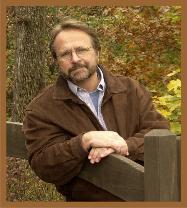
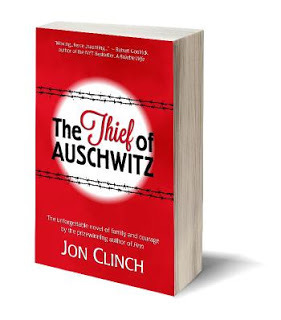
Jon Clinch has been an English teacher, folksinger, typeface designer, copywriter, and more. His first novel, Finn, was named an American Library Association Notable Book and was chosen as one of the year's best books by the Washington Post, The Chicago Tribune, and the Christian Science Monitor. It was also the winner of the Philadelphia Althenaeum Literary award and was shortlisted for the Sargent First Novel Prize. His next novel, Kings of the Earth, was named a Best Book of the Year by the Washington Post. His newest, the Thief of Auschwitz, is already racking up the raves. I'm thrilled to have him here--and read on, because at the end, he delivers a secret. Thanks so much, Jon.
So, tell us about the Thief of Auschwitz? How did the idea spark? What was the research like?
The idea came together from a number of things: family history, a couple of years' worth of reading, and one very particular dream.
The family history part is on my wife's side. There are no Auschwitz survivors—her grandparents on both sides left Europe before the war—but that doesn't mean that the memories and impressions aren't still there. Wendy recalls watching her grandmother play cards with friends when she was little, and noticing the serial numbers tattooed on some those ladies' forearms. So in the novel, when a survivor ruminates on the popularity of tattooing these days—"I say why disfigure yourself in advance, when if you wait long enough someone will come along and do it for you?"—he's speaking for her.
The couple of years worth of reading part is a long period during which I read, for no reason I can put my finger on and most definitely without any intent of writing my own book, pretty much every first-person account of the death camps that there is. Elie Wiesel's Night, Viktor Frankl's Man's Search for Meaning, Miklos Nyiszli's Auschwitz: A Doctor's Eyewitness Account, and so forth. I also a good number of histories, including most notably Laurence Rees' very fine Auschwitz: A New History. I didn't read any fiction on the subject—never have—with the sole exception of a little-read collection called This Way For The Gas, Ladies and Gentlemen,by Tadeusz Borowski, himself a survivor of the camps.
The cumulative effect of all this was a realization that regardless of how hard I tried to look at the facts of the Holocaust, those very facts seemed bent on repelling my attention. It was all too much. It was all too big. It was all too awful. I began wondering if other people faced this same problem, and eventually I decided that the answer might be to quit looking at it directly for a while, and to try looking at it through the lens of fiction. I thought I'd work with the tools that fiction makes available—narrative, character, pacing, poetry—and try building a story that would keep people's attention on the stuff that's so hard to look at otherwise. If I succeeded, it would be a kindness to the people who went through the reality. It would be, for lack of a better word, a mitzvah.
As for the very particular dream, it was this: One morning, long before I started writing the book or even thinking abou it, I woke up with the title in my head. The Thief of Auschwitz. Just like that. And I knew that one day I'd have to write it.
What I love is that people can get it on their KOBO reader, so they can give back to their neighborhood even as they buy e-books.
I love it too. And that little mini Kobo reader is just the coolest thing, isn't it? From the very outset, I didn't want this book to be an Amazon-only thing. It's very easy for micropublishers to take that route. In fact, it's more than easy; Amazon offers certain very real benefits for making your books exclusive to their platform. But I said no, because I wanted it as widely and traditionally available as possible, not just for its own sake but for the sake of the independent booksellers who help keep our reading culture vital. Getting it up on Kobo was an important part of that.
On my website, I maintain a list of links to independent booksellers who've committed to stocking The Thief of Auschwitz in paper. The list is bound to be incomplete—I only know about stores that contact me and let me know they're stocking the book—but I really like having it there.
You've been featured in BookRiot as one of the 5 books to watch, and you're getting quite a buzz. Any advice for other self-published writers? Do you feel the lines are starting to blur?
The lines are blurring in a lot of places, but they're still pretty clear in the traditional book media—where a great many newspapers and magazines simply will not review books that come from someplace other than big publishing. So quite a few papers that have raved previously about Finn or Kings of the Earth won't even be mentioning The Thief of Auschwitz. So be it. There are some things that I can't change, and it's no use fretting over them.
The buzz is nice. (In the entire publishing process, the only thing I hired out was a four-month contract with a publicist, so I'm glad it's paying off.) But believe me, I'll never forget that the chief reason folks have been interested in learning about The Thief of Auschwitz is that they're familiar with my previous books. That's given me a leg up without which I don't know what might have happened.
Further on the self-publishing front, I should note that I recovered the rights to Kings of the Earth a month or so ago, and I've just released it in paperback. Random House did only a hardcover, so it's been a long time coming. (I also should mention that an audio version of The Thief of Auschwitz is on its way from Recorded Books. Which will make Thief, as my daughter says, "the least self-published self-published book ever.")
What's your writing life like? Anything about being a writer surprise (or disturb) you?
My writing life has been compromised lately, I can tell you that. Getting this book out into the world has taken everything I've got.
There's no question, though, that I'll get back to work on a new project soon. I typically write about five hours a day, and I work very meticulously. The truth is that I can't leave a single unlovely sentence behind, so I polish as I go and scrub up after myself before moving on. It's definitely the opposite of the "get something on the page and clean it up later" school.
For me, the biggest surprise of the serious writing life was learning how right Mark Twain was when he said that the tanks would run dry on a given project now and then, and he'd have to turn his attention to something else until they filled up. I have at least three partial drafts under way now, one of them nearly complete, but I'm not sure that the tanks are full enough to start on any one of them right now.
What's obsessing you now?
Other than my sales numbers, you mean? Nothing. There's no room for anything else.
What question didn't I ask that I should have?
Try this: How did I feel a few months back when my alter ego, Sam Winston, got an email out of the blue from a certain Caroline Leavitt, asking to interview him (me) for Leavitville?
You could have knocked me over. I was happy that folks were talking about Sam's novel What Came After, and doubly glad that you thought highly of it, and triply glad that it was selling nicely without my name attached (which turned out to be one very good reason I felt I could get away with publishing The Thief of Auschwitz on my own). But I couldn't keep up the charade, as you remember. So I wrote you back as myself, and confessed that Sam was my secret identity.
What a world, huh?
Thanks for talking with Sam. And thanks for talking with me, too.
Published on January 12, 2013 10:43
Psychics. Real estate. New England life. Ann Leary talks about her new novel, The Good House

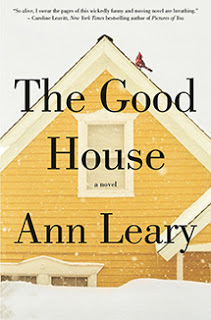
I first met Ann Leary at lunch at Japonica, and we talked and laughed and swapped stories until the dinner crowd began to come in. She's smart, hilarious, warm, funny--and a knockout writer, too. I was so honored to be able to blurb her new novel, The Good House, but even better, I made a friend. She's the author of the memoir, An Innocent, A Broad, and another novel, Outtakes From a Marriage. She's also the co-host of the wonderful weekly NPR radio show, Hash Hags. She competes in equestrian sports and is a volunteer EMT, too. Is there nothing Ann can't do? She's going to be reading this Wednesday at the uptown Barnes and Noble (2289 Broadway at 7). Thanks, thanks, Ann!
So tell us how the book sparked?
It's so fun to finally be able to talk about the book and characters after working on them for so long. I'm a recovering alcoholic. I drank alone a lot, so I really understand the blackout/closet drinking from a personal level. And I have relatives who are active alcoholics and know about how powerful denial can be. The character of Hildy is a composite of so many women I know. She's a real New Englander who presents herself as strong and capable, very judgmental, very unsentimental, but she's actually quite fragile and vulnerable and cares deeply about others, though she would die before she'd let anyone know it.
The book was originally going to be about a scandalous love affair between a shrink and his patient. There was a real story in the news a few years ago about a prominent NY psychiatrist who tried to kill himself after his former patient/lover threatened to reveal their affair, which would have ended his career. So originally Hildy was a sort of peripheral character and the book was being told from a third person narrative. But whenever I started writing about Hildy, her character kind of took over, because I understood her so well and finally I realized that I should just let Hildy tell the story and that's when the writing of this book started to work for me. I adore Hildy and originally felt so protective of her that I didn't allow her to be ugly or vindictive. I was protecting her, at first, like a child protects an alcoholic mother.
Sense of place seems to so important in your work. Can you talk about that, please?
I really wanted to write about a small town community. I moved to Marblehead, MA with my family when I was 14. We moved there after moving frequently from one nondescript midwestern industrial town to another. So I was at an age where I was very aware of people and personalities and the New England personality is so unique and unlike the personality of, say, a person from Racine, Wisconsin, that I was always studying all the townies - my friends, their parents. I always envied my friends who had grown up in the town - many had grandparents and great-grandparents who had grown up there and I was aware of a difference between the newcomers and the real townies, who were so deeply rooted to the history of the place.
There were so many wonderful real estate details, that I wanted to ask how you know what you know about it.
I think I fell in love with antique New England homes when we moved to Massachusetts. I've never worked in real-estate, but I'm a real-estate junkie. I guess it might be a result of moving so frequently when I was a kid. I look at real estate online the way a lot of men look at porn. It's a very pleasurable escape for me.
Hildy seems to know the tricks of psychics. Can you talk about that?
Regarding the psychic stuff, I know a few people who claim to have psychic abilities, but I've always been a sceptic, as I am a sceptic of religion and psychiatry, to a certain extent. I came across a series of videos on YouTube by a British man named Darren Brown, who debunks ESP, psychic powers, etc, though he appears to be able to read people's minds. He explains about the tricks psychics use. So I wanted Hildy to have the knowledge of these tricks and to be like Darren Brown. To constantly tell people she's not psychic and that she just uses tricks. But, though Hildy knows everything about everybody else in her town, she has very little insight into her own psyche. She tells us she's one way, but we see her behaving in a different way. So I wanted the reader to see that, though a lot of what she was doing was trickery, she also has a great deal of intuition and insight when it comes to others and some might consider her a sort of psychic. I just wanted to show the ways people turn to organized religion, psychiatry and the occult for answers and that's why I had these themes throughout. Also, I wanted to tie in the whole Salem/witchcraft thing. One of the reasons I set the story on the North Shore, so close to the town of Salem, is because I have always felt that a certain type of female alcoholic, because of the stigma, and their place in their community, feels a bit persecuted, almost like a witch. A person who, by day, tries to show an upstanding, moral persona, but by night engages in something that they love but that is too dangerous and shameful to reveal to others. I have to work on how to explain this in a more concise fashion.
What's your writing life like? Do you show your work to other people?
Oh, I'm totally the nervous/afraid to show others my work. I really have a hard time with that. That's why it's such a relief to find that you and others are liking the book!
Published on January 12, 2013 10:21



